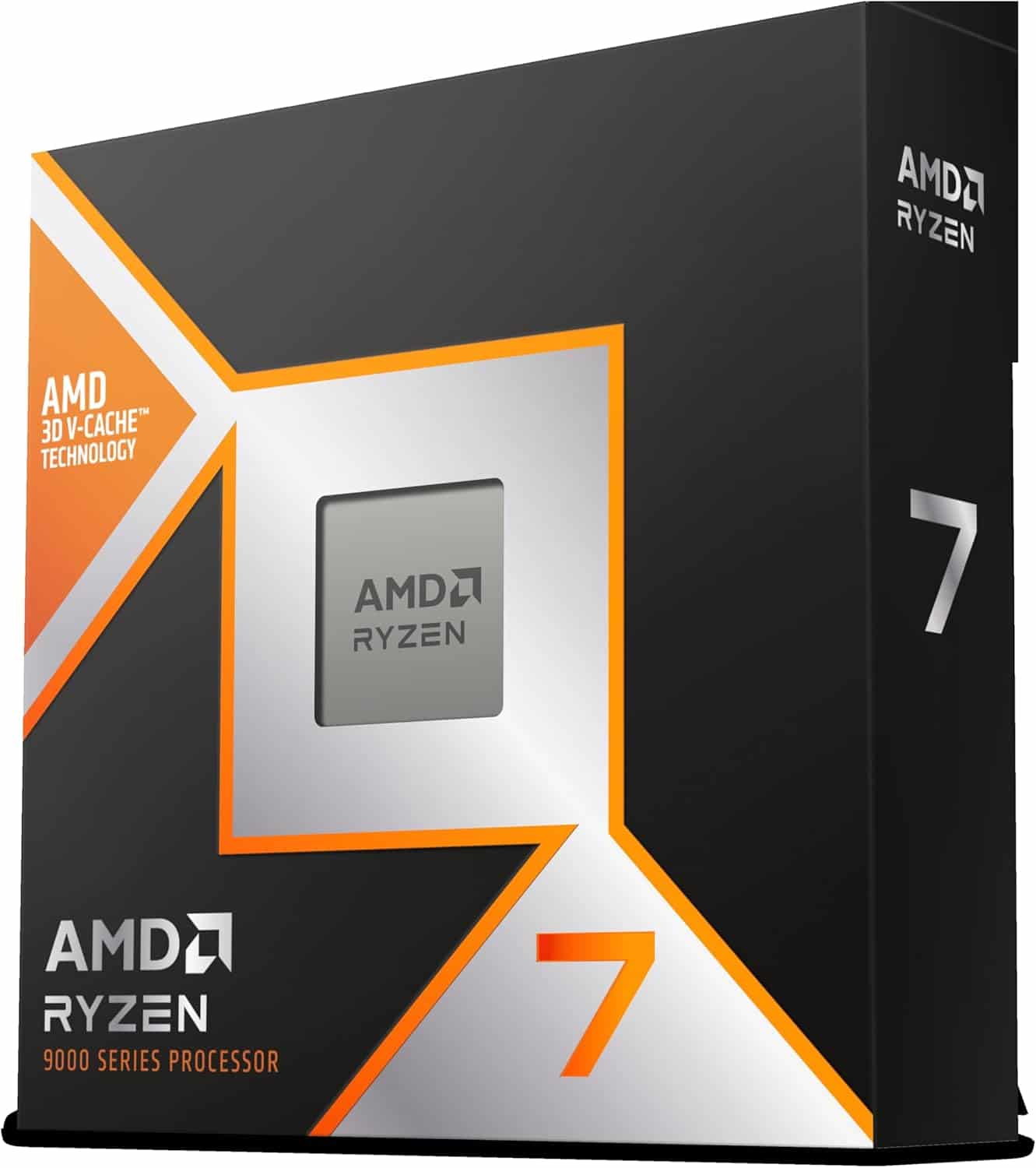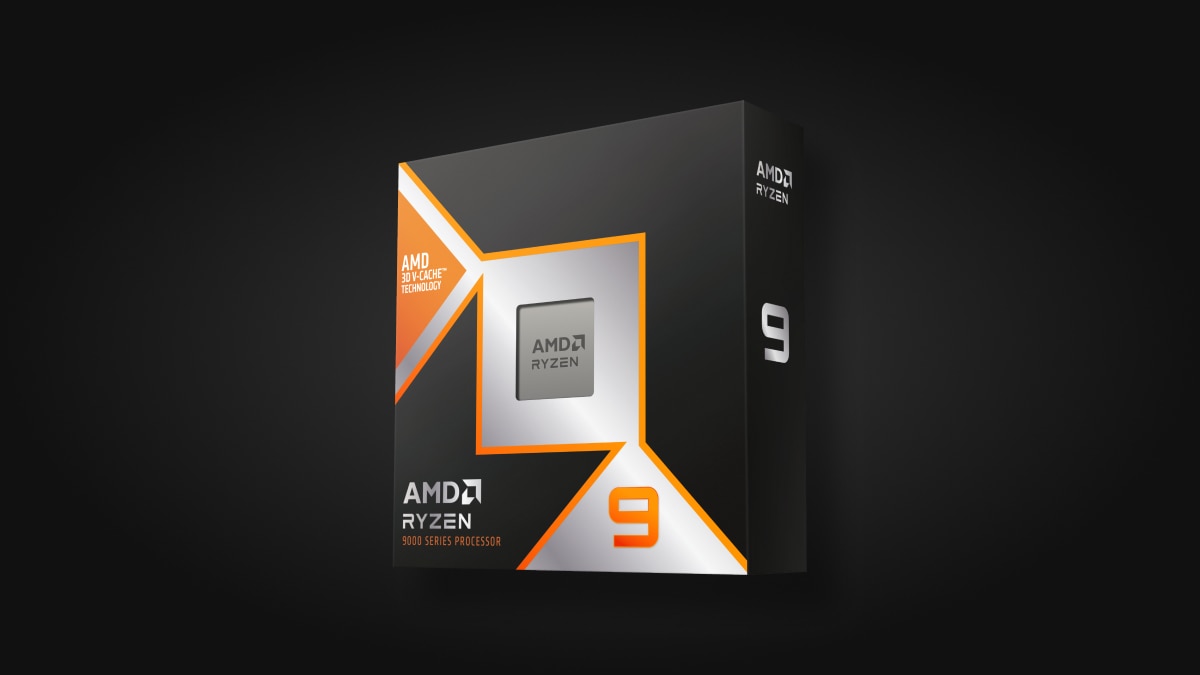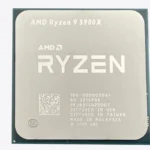In a year filled with next-gen hardware launches, AMD’s Ryzen 7 9800X3D remains the go-to choice for PC gamers who want unmatched performance without jumping to ultra-premium pricing. Despite the arrival of powerhouse chips like the Ryzen 9 9950X3D and 9900X3D, the 9800X3D has carved out a sweet spot in the market—delivering elite-level gaming performance at a more accessible price point.

Check the latest pricing and availability at Amazon: https://amzn.to/3ZDXrZ6
What Makes the Ryzen 7 9800X3D So Dominant in Gaming?
At its core, the 9800X3D continues AMD’s successful strategy of enhancing gaming CPUs with stacked 3D V-Cache. It builds on the legacy of the 5800X3D and 7800X3D, which were widely praised for their massive performance boosts in gaming due to the extra L3 cache.
The 9800X3D features:
- 8 cores / 16 threads
- Boost clock up to ~5.4 GHz
- Massive L3 Cache (96MB+) with 3D V-Cache
- Zen 5 architecture
- TDP around 120W
This configuration is ideal for gaming workloads, where high cache and fast single-core speeds deliver top-tier frame rates in CPU-bound titles like Counter-Strike 2, Starfield, and Hogwarts Legacy. Reviewers and benchmarks consistently show that the 9800X3D trades blows with even the more expensive Ryzen 9 9900X3D in pure gaming tasks, often matching or beating it in scenarios where additional cores offer no real advantage.
Price-to-Performance Champion
While the Ryzen 9 9950X3D and 9900X3D are absolute monsters, boasting 12 and 16 cores respectively, most games don’t utilize more than 8 threads effectively. That means the extra silicon in those chips often goes unused by gamers, making the 9800X3D a smarter buy unless you’re also doing heavy multitasking or content creation.
Additionally, the 9800X3D is typically priced $150–$200 lower than the flagship 9950X3D, which makes it ideal for high-refresh-rate gaming setups without the wallet burn.
AMD’s Broader X3D Lineup in 2025: What Else Is Out There?
Here’s a snapshot of the latest AMD processors that feature second-generation 3D V-Cache technology.
Desktop X3D Processors Comparison
| Model | Cores/Threads | Boost Clock | Cache (L2+L3) | TDP | Best For |
|---|---|---|---|---|---|
| Ryzen 9 9950X3D | 16C / 32T | Up to 5.7GHz | 144MB | 170W | Gaming + heavy multitasking |
| Ryzen 9 9900X3D | 12C / 24T | Up to 5.5GHz | 140MB | 120W | Gaming + streaming/editing |
| Ryzen 7 9800X3D | 8C / 16T | Up to ~5.4GHz | ~100MB | 120W | Pure gaming |
Both the 9950X3D and 9900X3D are based on AMD’s advanced Zen 5 architecture and make use of a unique vertical cache design that brings the cores closer to the heat spreader, improving thermal efficiency and sustaining higher clock speeds under load.
Mobile: Ryzen 9 9955HX3D
Bringing desktop-grade performance to laptops, the 9955HX3D includes:
- 16C / 32T Zen 5 cores
- Up to 5.4 GHz boost clock
- 144MB cache
- Radeon 610M integrated graphics
- Configurable TDP between 55W–75W
It’s part of AMD’s Fire Range laptop CPU family and targets gamers and creators who demand desktop performance in a mobile form factor.
Handheld Gaming: Ryzen Z2 Series
AMD also launched the Ryzen Z2 processors to power next-gen handheld gaming PCs. Key models include:
| Model | Cores/Threads | GPU Cores | Boost Clock | Cache | Target Device Class |
|---|---|---|---|---|---|
| Z2 Extreme | 8C / 16T | 16 (RDNA 3.5) | Up to 5.0GHz | 24MB | High-end handhelds |
| Z2 | 8C / 16T | 12 (RDNA 3) | Up to 5.1GHz | 24MB | Mainstream handhelds |
| Z2 Go | 4C / 8T | 12 (RDNA 2) | Up to 4.3GHz | 10MB | Compact devices |
These chips are designed with low power draw and integrated graphics to support Windows handheld gaming consoles, like the ROG Ally and Lenovo Legion Go successors.
Bottom Line
The Ryzen 7 9800X3D stands out in 2025 not just because it’s fast, but because it offers the best blend of raw gaming power, thermals, and price. While AMD’s high-end 9950X3D is impressive for creators and power users, most gamers will get nearly identical gaming performance with the 9800X3D—and have money left over for a better GPU or faster SSD.
With AMD’s continued push across desktop, mobile, and handheld platforms, the 9800X3D is a shining example of how targeted engineering (like 3D V-Cache) can still dominate even in a landscape filled with more expensive CPUs.
1. AMD Ryzen 9 9800X3D
The AMD Ryzen 9 9800X3D stands as the fastest gaming chip available on the market today. It outperforms even Intel’s more expensive processors when it comes to gaming performance.
What sets this processor apart is its 3D V-Cache technology. This feature gives the 9800X3D an edge in gaming by providing extra cache memory that games can tap into for better performance.
The CPU has become extremely popular among gamers who want top-tier performance. Its architecture allows games to access information faster, reducing lag and improving frame rates in demanding titles.
Benchmark tests consistently show the 9800X3D at the top of performance charts. It handles both current and upcoming games with ease, making it a future-proof investment for serious gamers.
Power efficiency is another strength of this processor. While it delivers exceptional performance, it doesn’t require as much power as some competitors, keeping your system cooler and your electric bill lower.
The 9800X3D works well with most modern motherboards that support AMD’s latest socket. This compatibility makes it a straightforward upgrade option for many existing systems.
Price-wise, though not cheap, the 9800X3D offers excellent value considering its performance. Gamers get premium results without paying the absolute highest prices in the CPU market.
For streamers who game and broadcast simultaneously, this processor handles the dual workload smoothly. The multi-core performance allows for gaming while encoding video without noticeable slowdowns.
Compared to previous generation AMD gaming processors, the 9800X3D represents a significant leap forward. Users upgrading from older systems will notice dramatic improvements in their gaming experience.
Factors to Consider When Choosing an AMD Processor for Gaming
When selecting an AMD processor for gaming, you need to focus on specific technical aspects that directly impact performance. Your choice will significantly affect how well games run on your system.
Core Count and Threads
The number of cores and threads in your AMD processor plays a crucial role in gaming performance. Most modern games use multiple cores, but they don’t all need the highest core count available.
For budget-conscious gamers, processors with 6 cores like those in the Ryzen 5 series provide a good balance for most games. These processors handle current titles efficiently without breaking the bank.
Mid-range to high-end gaming benefits from 8-core processors such as the Ryzen 7 series. The extra cores help with multitasking while gaming, especially if you stream or run background applications.
For enthusiasts who want maximum performance, the 12-16 core Ryzen 9 processors offer exceptional capabilities. However, many games won’t fully utilize all these cores, so the premium price may not translate to proportional gaming improvements.
Clock Speed and Overclocking Potential
Clock speed (measured in GHz) often matters more than core count for pure gaming performance. Higher clock speeds mean faster processing of game instructions.
Base clock speed indicates the processor’s standard operating frequency, while boost clock shows its maximum potential speed. The AMD Ryzen 7 9800X3D stands out with excellent clock speeds optimized for gaming.
When comparing processors, look at both single-core and multi-core performance benchmarks. Single-core speed often has a greater impact on frame rates in many games.
Overclocking capability allows you to push the processor beyond factory settings. AMD’s “X” series processors (like the 7700X) have unlocked multipliers for easier overclocking. Remember that effective overclocking requires good cooling solutions and a compatible motherboard with quality VRMs.
Processors with AMD’s 3D V-Cache technology (like the 9800X3D) offer significant gaming advantages due to increased cache size, even with slightly lower clock speeds.
Understanding AMD’s Processor Lineup
AMD’s processor lineup offers different options for gamers with varying needs and budgets. The company organizes their CPUs into distinct families with different performance levels and target uses.
Ryzen Series Overview
AMD’s Ryzen processors come in several tiers, each targeting different performance levels. The Ryzen 3 series serves as the entry-level option for budget-conscious gamers. These chips offer decent performance for less demanding titles.
Ryzen 5 processors hit the sweet spot for many gamers, balancing cost and performance. They typically feature 6 cores and strong mid-range capabilities.
Ryzen 7 CPUs step up to 8 cores and higher clock speeds, making them excellent for both gaming and content creation. The Ryzen 7 9800X3D currently stands as AMD’s fastest gaming chip and outperforms even more expensive competitors.
For ultimate performance, Ryzen 9 processors like the 7950X deliver top-tier performance with higher core counts and exceptional multi-tasking abilities.
Difference Between Desktop and Mobile Processors
Desktop AMD processors offer maximum performance without power or thermal constraints. They use more electricity but provide better cooling options and higher sustained performance. Desktop CPUs also support overclocking, letting users push performance beyond factory settings.
Mobile Ryzen processors (found in laptops) balance performance with power efficiency. They typically have lower base clock speeds but can temporarily boost when needed. This design helps preserve battery life while still providing good gaming performance when plugged in.
Mobile variants are often identified by the “H” suffix for high-performance or “U” for ultra-efficient models. The “H” series targets gaming laptops with their stronger graphics capabilities and higher sustained power.
AMD’s mobile processors integrate more features directly on the chip to save space in compact laptop designs.
Frequently Asked Questions
AMD processors offer many options for gamers looking to build their next PC. The right choice depends on your budget, gaming needs, and what other tasks you plan to do with your computer.
What are the top Ryzen CPUs for gaming performance in 2025?
The AMD Ryzen 9 9800X3D currently stands as the best gaming processor from AMD in 2025. This CPU offers exceptional performance due to its 3D V-Cache technology, which gives games extra memory to work with.
The Ryzen 7 series also performs admirably for gaming, with models that balance cost and performance for serious gamers who don’t want to spend top dollar.
For those seeking absolute peak performance, the Ryzen 9 series provides more cores and threads, which helps not just with gaming but also with streaming and content creation.
How does the Ryzen 7 series compare to the Ryzen 9 for gaming purposes?
The Ryzen 7 offers excellent gaming performance at a more accessible price point than the Ryzen 9. For most games, the difference in frames per second between these two tiers may not justify the extra cost of the Ryzen 9.
Ryzen 7 processors typically have enough cores and speed to handle modern games without bottlenecking even high-end graphics cards. They strike a sweet spot for gaming value.
Ryzen 9 processors shine when gaming is combined with streaming, video editing, or running background applications. Their extra cores help maintain smooth gameplay while handling these additional tasks.
What is the best budget-friendly AMD CPU for gaming currently on the market?
For budget-conscious gamers, the Ryzen 5 series provides strong gaming performance without breaking the bank. These processors deliver enough power to run most modern games at respectable settings.
If looking at slightly older generations, the 5800X3D offers exceptional gaming value. Despite being from a previous generation, its 3D V-Cache technology makes it surprisingly capable for modern gaming.
Intel’s Core i5 13400F is another budget option mentioned in gaming CPU discussions, but within AMD’s lineup, the Ryzen 5 series remains the most cost-effective entry point for gamers.
For gaming enthusiasts, which is more preferable: Ryzen 5 or Intel i7?
This comparison crosses brand lines and depends on specific models being compared. Generally, newer Ryzen 5 processors compete well with Intel i7 chips in gaming, often at lower prices.
Intel i7 processors traditionally offered better single-core performance, which benefited games. However, AMD has closed this gap significantly with recent Ryzen generations.
The choice often comes down to pricing, power consumption, and platform costs including motherboards. AMD platforms typically offer better upgrade paths and more consistent socket compatibility.
Can you list the high-performing AMD processors suitable for running advanced games?
The Ryzen 9 9800X3D tops the list for advanced gaming, offering the best performance for the most demanding titles. Its specialized cache design specifically benefits game performance.
Ryzen 7 processors from the 9000 series provide excellent performance for advanced games while costing less than the flagship models.
For those willing to look at previous generations, the Ryzen 7 5800X3D still handles advanced games very well, thanks to its innovative cache design that specifically benefits gaming workloads.
What should consumers look for in an AMD CPU when building a gaming PC?
Core count and clock speed matter for gaming, but don’t just chase the highest numbers. For gaming-focused builds, 6-8 cores usually provide the best balance.
Consider processors with AMD’s 3D V-Cache technology if gaming is your primary focus. This technology specifically benefits game performance more than general productivity tasks.
Budget allocation is crucial when building a gaming PC. Sometimes it’s better to choose a mid-range CPU and spend more on the graphics card, which often has a bigger impact on game performance.







